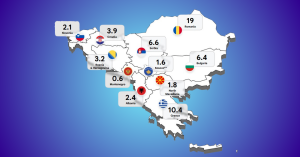In the 80’s one small team of engineers independently developed a computer that changed the future of computers forever. The Apple Macintosh computer (aka MAC) is still one of the most famous intrapreneurship products. Steve Jobs described the process in the following way: “The Macintosh team was what is commonly known as intrapreneurship – only a few years before the term was coined – a group of people going in essence back to the garage but in a large company.”
Unlike founding a startup, intrapreneurship is a process in which employees develop their own ideas with the support of the companies they work for. With the ultimate goal to add value to a company’s employees and clients, intrapreneurship can take many forms – from a team collaboration tool, or a new solution for collecting customer feedback, to the creation of entirely new product lines.
In this story, we gathered insights on the innovation initiatives and practices of 4 Bulgarian companies to understand how the intrapreneurship process works and what business value it conveys to organizations.
Sirma Group’s long entrepreneurial history
“Since its inception, Sirma has been dedicated to developing innovative ideas into products or solutions. A large part of our product companies have historically been the result of intrapreneurship,” says Momchil Zarev, Chief Commercial Officer at Sirma Solutions, part of the Sirma Group, a company specializing in IT technologies, software development, and system integration
Examples of Sirma’s intrapreneurship projects are Ontotext (GraphDB), a company that offers semantic technologies and was acquired by Integral Venture Partners for € 30M, and EngView Systems (CAD-CAM). Another recent example of a successful internal entrepreneurial initiative is the diabetes management app, Diabetes:M, and the spin-off company that was created around it – Sirma Medical Systems.
Based on the Diabetes:M app, Sirma employees have also created another product for digitization of healthcare and telemedicine – Medrec:M. The product is a digital patient record for scheduling specialist appointments, remote examinations, and sharing high-quality imaging documents. This year the company implemented a joint initiative with Innovation Capital. “Sirma Venture Lab is a continuation of our tradition to support promising startups and allow them to unleash their potential and build successful businesses and brands,” says Momchil Zarev.
“We cannot say that we have a specific policy for promoting internal entrepreneurship in the company, but we encourage innovative thinking and entrepreneurial enthusiasm. Suppose one of the colleagues has an idea and a desire for development or has already created an application or a prototype of a product independently. In that case, we are ready to support him, both financially and technologically,” explains Yordan Nedev, Director of Investments and Mergers and Acquisitions (M&A) and member of the board of directors of the Sirma Group.
How does VMware foster a startup mindset?
“At VMware, we have a sustainable intrapreneurship ecosystem that spans the entire journey from the birth of an idea to its realization. The company offers opportunities for collaboration and knowledge exchange between teams (TechTalks), time to work on new ideas (Take 3), forums to present these ideas (RADIO), and a range of funding and development mechanisms (Flings, xLabs),” shares Veselin Arnaudov, Director of Advanced Technology Group at VMware.
All these initiatives are part of the Office of the CTO business group of VMware. The company’s Advanced Development Center team, which Veselin Arnaudov leads, organizes, promotes, and monitors the success of these initiatives.
An example is the Borathon series of hackathons that take place twice a year. They enable VMware employees to work together on the ideation and delivery of product improvements. So far, over 300 such ideas have been presented from the Sofia team alone, while this year a Bulgarian team took first place in the global Borathon hackathon.
Part of VMware’s intrapreneurship programs is the three-day technological conference RADIO (R&D Innovation Offsite). It is the largest ideation platform that brings together thousands of engineers from all over the world. Each proposal for product improvement goes through a rigorous selection process, and the best ones are presented to the global or regional RADIO chapter. For the last 15 years, Bulgaria has hosted 13 regional editions, while Bulgarian engineers also participate in the jury which selects the best international ideas.
An important element in all intrapreneurship programs is access to time and financial resources. VMware provides each employee with an individual budget to finance participation in conferences, seminars, or training, as well as with time to prepare and participate in Borathon, RADIO, or TechTalks. The realization of the best ideas is supported by the company’s “innovation pipeline”, part of which is xLabs – the in-house venture capital fund of VMware. In addition to funding, xLabs provides employees with engineering resources to help employees turn their ideas into new products or solutions.
Bosch’s mission to support the innovation ecosystem
“Bosch has been cooperating with startups for a long time and we have various entrepreneurial programs that are aimed both internally at the organization itself and externally. We offer innovative solutions for smart homes, connected mobility, and Industry 4.0, and our organizational strategy defines that by 2025 all Bosch products will include some form of AI technology. To support this vision, we are open to partnerships with young and innovative companies, and the benefits of such partnerships are many,” says Atanas Atanasov, Team Leader at Bosch.IO and Manager of Bosch Startup Harbour for Bulgaria.
On the one hand, this helps the company to discover new ideas, and connect with specialists who work very closely in a certain technological field. On the other hand, it promotes the development of startup ecosystems. The main entrepreneurial programs of the company – Bosch Venture Capital GmBH and Bosch Startup Harbor accelerator, target the development of external innovations. Starting this year, Bosch Startup Harbor opened its doors to Bulgaria with two Bulgarian startups in the field of Machine Learning and Extended Reality participating in the program. These are Efemarai and QuarkXR.
“Although the program is aimed at external startups, it is carried out in collaboration with experts from various divisions of Bosch. Therefore, this is another opportunity for our employees to develop themselves and exchange ideas with their colleagues from the accelerator,” explains Atanas Atanasov.
Bosch also has an internal program called Grow, which works closely with the group’s R&D team. Grow is a separate company within Bosch and operates as an internal incubator. Currently, there are more than 250 Bosch intrapreneurs who participate in Grow, incubating 11 active startups. One of these intrapreneurial products is Spexor, a smart mobile sensor, which detects intrusion, and measures air quality and temperature. Another product is Aqua Easy, which allows shrimp farmers to save time and resources by optimizing their production process.
SiteGround’s technical internal initiatives
SiteGround, the Bulgarian web hosting and software services company, encourages innovative thinking and non-standard approaches to solving internal technical challenges. As a result, the company has a number of initiatives that build on its core products to make them more competitive, flexible, and relevant for SiteGround’s customers.
Examples of in-house products that are the result of the entrepreneurial proactivity of SiteGround employees are their UltraFast PHP development, which speeds up their clients’ websites by over 30% and combines performance with security. “In other implementations of such solutions, either the security or the performance element is sacrificed. We found a technical solution that allowed us to improve performance while maintaining and even increasing the security of customers’ websites,” SiteGround explains. Another intrapreneurial project of SiteGround is the File Upload Malware Scanner and Quarantine – a system that stops malicious code in real-time and quarantines it in a separate folder.
Besides technical projects, which are mostly developed by the company’s IT teams, SiteGround encourages a number of social intrapreneurial initiatives. For instance, the Host A Cause project has supported more than 100 Bulgarian social initiatives by providing them with free website hosting and maintenance.
This article is part of a joint project between DEV.BG and The Recursive.







